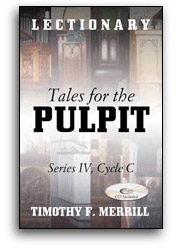A Song Of Mary
Stories
Lectionary Tales For The Pulpit
Series IV Cycle C
During the fourteenth century, the greatest pestilence swept through Europe that has ever been recorded in history. Called the "Black Death," the disease claimed its victims by the thousands in every country of the old world. In that dreadful time, people sought to save their lives by isolation. Since a touch or the sweep of a passing garment might bring death, many barred themselves up in their houses with such provisions as they could gather.
In this way did one of the citizens of Goldberg, Germany, save his life until a Christmas Eve in 1353. He thought himself to be the last inhabitant of the plague-stricken village, and as the time of the joyous festival approached, he could not but recall how many of his old companions had joined with him in merry-making in the past years, and now he was left alone in the midst of desolation. The thought must have borne in upon him that his life was not worth saving at the price of such loneliness, for he unbarred his door and went out into the street to risk the plague.
As he went forth, he sang the Christmas song that he had sung in the old days with his friends, a song of Mary called "Uns ist ein Kindlein Heut' Gebron" ("To Us Is Born A Child Today"). As he started singing, he was astounded to hear a voice respond to his own, and in a little while another citizen had unbarred his door and sang with him; as the two went down the street they were joined by another, and yet another until when they had come to the end of the road by a hill where a little band of 25 men, women, and children had gathered -- all that was left of the town of Goldberg. None of this little band had died of the Black Death. They returned to their homes, set their houses in order, and the town began to prosper anew.
But each Christmas Eve for centuries after this event (even now), the inhabitants of that town gather together for worship at midnight and together they march to the hill where all unite in singing the chorale:
To us this day is born a child.
God with us. God of love.
His mother is a virgin mild.
God with us. God of love.
Against us who dare be?
In this way did one of the citizens of Goldberg, Germany, save his life until a Christmas Eve in 1353. He thought himself to be the last inhabitant of the plague-stricken village, and as the time of the joyous festival approached, he could not but recall how many of his old companions had joined with him in merry-making in the past years, and now he was left alone in the midst of desolation. The thought must have borne in upon him that his life was not worth saving at the price of such loneliness, for he unbarred his door and went out into the street to risk the plague.
As he went forth, he sang the Christmas song that he had sung in the old days with his friends, a song of Mary called "Uns ist ein Kindlein Heut' Gebron" ("To Us Is Born A Child Today"). As he started singing, he was astounded to hear a voice respond to his own, and in a little while another citizen had unbarred his door and sang with him; as the two went down the street they were joined by another, and yet another until when they had come to the end of the road by a hill where a little band of 25 men, women, and children had gathered -- all that was left of the town of Goldberg. None of this little band had died of the Black Death. They returned to their homes, set their houses in order, and the town began to prosper anew.
But each Christmas Eve for centuries after this event (even now), the inhabitants of that town gather together for worship at midnight and together they march to the hill where all unite in singing the chorale:
To us this day is born a child.
God with us. God of love.
His mother is a virgin mild.
God with us. God of love.
Against us who dare be?


